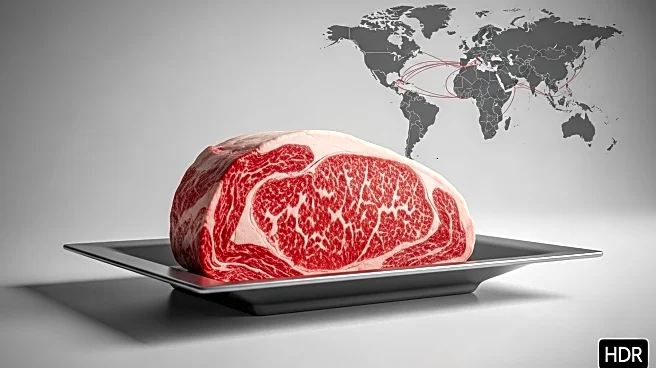What's Happening?
The imposition of U.S. tariffs on Brazilian beef is expected to significantly alter global beef trade flows. Analysts predict increased shipments to the U.S. from countries like Mexico and Australia, while Brazil seeks alternative markets. Brazil, the world's largest beef exporter, has seen Mexico overtake the U.S. as its second-largest export destination. This shift may lead to countries triangulating Brazilian beef to increase their purchases, with Argentina potentially importing and re-exporting to the U.S. Additionally, U.S. trade deals with Southeast Asian nations are set to reshape grains and oilseed trade flows, with increased American shipments displacing Australian, Canadian, and Russian supply.
Why It's Important?
The reshaping of global trade flows due to U.S. tariffs and trade deals has significant implications for the agricultural industry. For beef producers, the tariffs could lead to increased competition and changes in market dynamics, affecting pricing and supply chains. The shift in grains and oilseed trade flows may impact global suppliers, driving up costs for rivals and altering market shares. These developments highlight the interconnectedness of global trade and the potential for policy changes to influence industry dynamics. Stakeholders in the agricultural sector must adapt to these changes to remain competitive and capitalize on new opportunities.
What's Next?
As the U.S. tariffs and trade deals continue to influence global trade flows, stakeholders in the agricultural industry will need to monitor market trends and adjust their strategies accordingly. Countries affected by these changes may seek to negotiate new trade agreements or explore alternative markets to mitigate the impact. The U.S. may also face pressure to reassess its trade policies to balance domestic interests with international relations. The ongoing shifts in trade dynamics could lead to further negotiations and adjustments in global agricultural trade policies.
Beyond the Headlines
The changes in global trade flows due to U.S. tariffs and trade deals underscore the broader geopolitical implications of trade policies. These developments may influence diplomatic relations and economic partnerships between countries, potentially leading to shifts in alliances and trade strategies. The agricultural industry, as a key component of global trade, serves as a barometer for broader economic trends and policy impacts. Understanding these dynamics is crucial for stakeholders to navigate the complexities of international trade and maintain competitive advantages.









